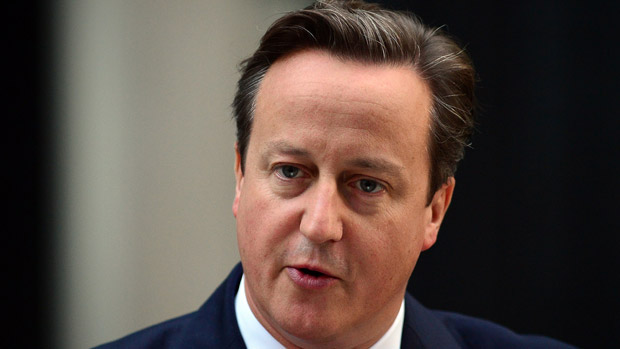Cameron to meet Iran's president Rouhani over Syria intervention
Historic first talks between leaders of two nations since 1979 revolution will focus on Islamic State

A free daily email with the biggest news stories of the day – and the best features from TheWeek.com
You are now subscribed
Your newsletter sign-up was successful
David Cameron will this week become the first British Prime Minister to hold talks with an Iranian president since the country's 1979 revolution. Cameron and Hassan Rouhani will discuss the possibility of Iran supporting a US-led coalition to fight fundamentalists in Syria.
The bilateral talks, to be held in New York where both men are attending a UN general assembly, are also remarkable because the idea that Iran might support the country it dubs the 'Great Satan' in carrying out a military campaign in the Middle East would have been unthinkable until very recently.
Iran has so far been excluded from all international talks about Syria and has supported the country's embattled president, Bashar al-Assad, during the country's civil war says The Guardian. Nor was it allowed to join the recent Paris summit on how to combat the threat of Islamic State.
The Week
Escape your echo chamber. Get the facts behind the news, plus analysis from multiple perspectives.

Sign up for The Week's Free Newsletters
From our morning news briefing to a weekly Good News Newsletter, get the best of The Week delivered directly to your inbox.
From our morning news briefing to a weekly Good News Newsletter, get the best of The Week delivered directly to your inbox.
However, Rouhani has been a "fierce critic" of IS, says the paper. Rather than condemning the US air strikes on the militants he has said that "maybe it is necessary". Before travelling to New York, he even criticised Obama for his unwillingness to commit ground troops to the fight.
Rouhani said: "Are Americans afraid of giving casualties on the ground in Iraq? Are they afraid of their soldiers being killed in the fight they claim is against terrorism?
"If they want to use planes and if they want to use unmanned planes so that nobody is injured from the Americans, is it really possible to fight terrorism without any hardship, without any sacrifice?
"Maybe it is necessary for air strikes in some conditions and some circumstances. However, air strikes should take place with the permission of the people of that country and the government of that country."
A free daily email with the biggest news stories of the day – and the best features from TheWeek.com
The US began air strikes on IS in Syria, as opposed to Iraq, yesterday, in concert with unspecified Arab nation allies, while the Daily Telegraph reported last night that RAF Tornado aircraft stationed in the Middle East have been "ready to go for weeks".
However, the paper says while David Cameron is willing to join the US in carrying out air strikes on IS in Iraq, he will stop short of bombing Syria, because he is "acutely aware of opposition in all three political parties to a Syria intervention".
-
 Trump’s fuel blockade puts Cuba in crisis mode
Trump’s fuel blockade puts Cuba in crisis modeIN THE SPOTLIGHT Plummeting tourism, scrambling airlines and rolling blackouts are pushing Cuban society to the brink
-
 ‘The mark’s significance is psychological, if that’
‘The mark’s significance is psychological, if that’Instant Opinion Opinion, comment and editorials of the day
-
 How did ‘wine moms’ become the face of anti-ICE protests?
How did ‘wine moms’ become the face of anti-ICE protests?Today’s Big Question Women lead the resistance to Trump’s deportations
-
 Epstein files topple law CEO, roil UK government
Epstein files topple law CEO, roil UK governmentSpeed Read Peter Mandelson, Britain’s former ambassador to the US, is caught up in the scandal
-
 Iran and US prepare to meet after skirmishes
Iran and US prepare to meet after skirmishesSpeed Read The incident comes amid heightened tensions in the Middle East
-
 Israel retrieves final hostage’s body from Gaza
Israel retrieves final hostage’s body from GazaSpeed Read The 24-year-old police officer was killed during the initial Hamas attack
-
 China’s Xi targets top general in growing purge
China’s Xi targets top general in growing purgeSpeed Read Zhang Youxia is being investigated over ‘grave violations’ of the law
-
 Panama and Canada are negotiating over a crucial copper mine
Panama and Canada are negotiating over a crucial copper mineIn the Spotlight Panama is set to make a final decision on the mine this summer
-
 Why Greenland’s natural resources are nearly impossible to mine
Why Greenland’s natural resources are nearly impossible to mineThe Explainer The country’s natural landscape makes the task extremely difficult
-
 Iran cuts internet as protests escalate
Iran cuts internet as protests escalateSpeed Reada Government buildings across the country have been set on fire
-
 US nabs ‘shadow’ tanker claimed by Russia
US nabs ‘shadow’ tanker claimed by RussiaSpeed Read The ship was one of two vessels seized by the US military